If you could get a really good ribeye at McDonald’s, would you be willing to pay a Peter Luger steakhouse price for it?
Probably not.
Especially if you had to eat it at McDonald’s.
If it seems obvious to you, it wasn’t to Ferdinand Piëch, the legendary grandson of Ferdinand Porsche and scion of the dynasty who became head of Audi and then Volkswagen. A smart guy who got a lot of things right doesn’t always get everything right.
Most notably, in this case. That of the Phaeton – which was introduced as a new 2003 model and departed (from the U.S. market) in 2006, as a failed model.
It was a VW that cost as much – or more – than an equivalent Mercedes but wasn’t a Mercedes. Hence the problem.
Piëch’s intention was to offer a car that was better than a Mercedes, by the numbers – by such metrics as the torsional rigidity of its body, its features and amenities – which included four-zone climate control and radar-adaptive cruise control, cutting edge stuff in the early 2000s. And by one-upping Benz, et al, by offering the first production W12 engine, a type of engine unavailable in any Benz or anything else, for that matter. It was essentially two V6 engines paired in tandem and it summoned a spectacular – and spectacularly smooth – 420 horsepower, a respectable number for an uber car (not the kind you summon using your phone) even nearly 20 years after the fact. 
The design criteria for the car – which was closely related to the Bentley Continental Flying Spur – included a specification that it be capable of cruising all day at 186 MPH – though the production car was electronically limited to a stop speed of only 130 MPH.
Like the Bentley, the Phaeton was not mass-produced but largely hand-assembled by a dedicated team of craftsmen at the Glaserne Manufaktur (glass-walled) plant in Dresden, Germany. It received the best materials and workmanship VW could summon, which was a lot – much of it summoned from Audi as well as Bentley, both of them part of the VW empire at the time.
But you can’t sell Peter Luger steaks at McDonald’s. Especially when they look like Quarter Pounders with Cheese.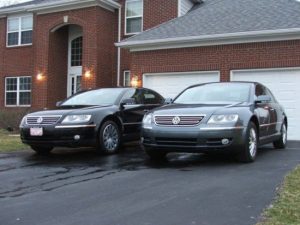
The latter may have been even more of a problem than the lack of a prestigious badge – and an exclusive store – to entice people with the wherewithal to spend the $65,600 – in 2003 dollars – it took to buy the base-trim Phaeton with the less prestigious 335 horsepower 4.2 liter V8 engine. That sum is equivalent – in 2021 Bolivarian dollars – to about $98,000 today. Which was the equivalent – back in 2003 – of the combined cost of three well-equipped Passats.
Which was a problem, because – at a glance – the Phaeton looked like a Passat. A little longer and larger, to be sure. A lot nicer, for sure – in terms of what was inside, which included hide-away air vents and cupholders that opened only when in use, automatically-rising head bolsters for the backseat passengers, who could tailor the airflow and temperature of the heat and AC to their individual liking.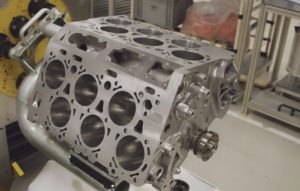
And under the hood, there was at least a V8, with the formidable and exclusive W12 available – whereas the most you could get in a Passat was half the W12, in the form of one of the two V6 engines used to create it.
But it still looked a lot like a Passat – and that was problematic for people who didn’t want to look like they had a VW in their garage. The styling was deliberately under-stated. To the point of obliviousness. Well, except for the VW badge on the trunk – which was impossible not to notice. The result was a People’s Car for people who couldn’t afford it.
And which rich people avoided.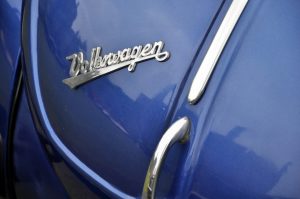
Piëch – who ought to have known better – failed to remember the dictum that people who buy prestigious cars want prestigious cars. That is to say, they want cars that don’t look like bread-and-butter cars. A Mercedes S-Class looks like a Mercedes – and that is a big part of the reason why people are willing to spend six figures on one, even if it comes standard with a six (as the current version of the Mercedes S-Class sedan does). When its owner rolls up beside a Passat there is no mistaking who’s who – no matter what’s under the hood. And when the Mercedes owner needs to have his car serviced, he goes to a Mercedes dealer. He does not have to mingle with people who cannot afford a Mercedes.
The Phaeton owner may have paid more than six figures – $140,000-plus, in today’s Bolivarian dollars – for a new W12-powered Phaeton back in 2003 – but he had to take his Passat (whoops, Phaeton) to a store that handled $17k New Beetles. Which he had to, often – because of the electrical gremlins the car was plagued by that led to frequent trips there.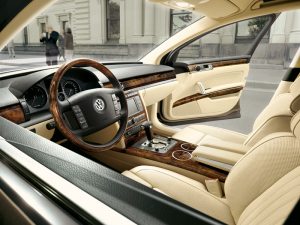
In 2004, Automobile magazine writer Robert Cumberford wrote about problems with the press car Phaeton loaned to him for review:
“Irreparable. A good word for a bad condition, one that seemingly applies both to the electrical system of our Four Seasons and to the reputation of Ferdinand Piëch, who brought this magnificently irrelevant (rich) People’s Car into existence . . .On the plus side, the car never failed to start and never failed to deliver its driver and passengers to their destination.”
Maybe there was a Mr. Coffee pot and styrofoam cups in the waiting room. Not exactly the vibe people in the six figure bracket expect – and pay for.
Not surprisingly, very few did. As in almost no one did.
VW had hoped to sell around 20,000 Phaetons in the United States annually, which was roughly the capacity of the Dresden assembly plant.
About 1,433 were actually sold during the first full year of availability – almost all of them heavily discounted, further eroding the prestige of ownership in a class where bragging rights go to he who pays the most, which has the corollary effect of preventing those who cannot pay for what he is driving. But when they – those ordinary people with VW money to spend – can buy a fire-sale’d Phaeton that listed for $65k with $20k lopped off the MSRP – and this happened, regularly, as dealer desperation to get rid of the cars kicked up – it tends to annoy the people who paid the full $65k and disinclines those who can pay such sums from paying them.
In Canada, it was even more catastrophic. Fewer than 100 cars were sold – an exclusivity all its own but not the kind that Piëch had been aiming for. It was an Aztekian debacle, which may have been some kind of strange karma given that the Pontiac Aztek made its belly flop right around the same time. Maybe there was something in the water.
Given that the first year of a new model car is usually the best year, the Phaeton’s disastrous inaugural year presaged doom of the first order. During the entirety of its second year on the market, VW was only able to entice 841 people in the United States and Canada – combined – to part with Mercedes money for a six figure VW. That’s 820 in America and 21 north of the border.
It made the Aztek seem like – cue Borat voice – a great success.
Making matters much worse – if such a thing is conceivable – the W12 engine was forbiddingly complex and so forbiddingly expensive to repair, which repairs many VW dealers were unable to deal with, being VW dealers and being used to dealing with relatively straightforward, mass-market VW engines – not exotic, hand-assembled engines. Problems keeping the cars running caused the cars to depreciate even more rapidly than a Boliviarian dollar, such that a six figure W12 Phaeton wasn’t worth much more after as little as five years than a new $30k Passat.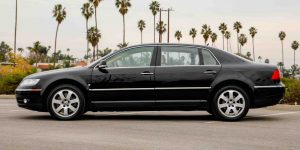
Top Gear magazine included the Phaeton on its roster of Worst Cars You Can Buy Right Now – not because the Phaeton was a bad car, per se. But rather because of the sucker punch that attended the purchase of an exotic car by a person without the means to keep an exotic car on the road. Phaetons were cheap to buy – but not to keep. The rich didn’t want them and the proletariat could not afford to service them.
With both prestige and money hemorrhaging at busted Hoover Dam volumes, VW did the merciful thing and cancelled the car in late 2005, with the 2006 models being the last of the line – in North America. VW did continue making the Phaeton all the way through 2016, chiefly on the strength of sales in China and South Korea.
Perhaps because “VW” translates as “Superlative Chariot of the Emperor.” And maybe also because the dealers put a Keurig in the waiting room.
. . .
VW Phaeton Facts
-
- In 2005, VW displayed an even more uber version of the Phaeton called the Phaeton Lounge, that emulated – or prequeled – the Daimler Maybachs purveyed by Mercedes-Benz. It featured two pairs of rear-facing recliners in the back, a minibar with front and rear wine coolers, cigar humidor, multicolor LED mood lighting and a cigar humidor.
- In Europe and Asia, the Phaeton was even more Passat-like as it came standard with the same basic V6 that came in same-era Passats; a diesel V6 and V10 were also offered.

- Though it looks a lot like a Passat, the Phaeton is more closely related to the Audi A8 and shares DNA with the Porsche Panamera – a car that people who can afford to pay six figures for are willing to pay six figures for.
- Second-generation Phaetons were offered in standard and extended wheelbase iterations and in either four or five seat configurations. VW’s 4-Motion all-wheel-drive system was standard, along with an adjustable suspension.
- Gerhard Schroder – who was chancellor of Germany when the Phaeton made its debut, selected one as the official state limousine, apparently a gesture to try to fluff up the car’s prestige.
- Though the Phaeton was more powerful than rival models from prestige-branded companies (including in-house prestige-branded Audis, like the A8) it wasn’t as quick because it was significantly heavier. V8-equipped models got to 60 MPH in just over 6 seconds; models with the optional W12 slid in just under that.
- One thing the Phaeton did have in common with other six figure cars was a six figure car’s appetite. The V8 version rated 16 city; if you opted for the W12, this fell to 12 city, 18 highway – making the car even more unaffordable to keep for the average people who bought one at a fire-sale’d price.
- All told, approximately 84,253 Phaetons were manufactured over the car’s fifteen-year production run, with the majority being sold in Asia.
- The Economist lists the Phaeton as one of the most money-losing cars ever offered for sale by a European car company.
- According to the latest Kelly Blue Book and NADA used car pricing guides, it is possible to buy a used Phaeton in “good condition” today for about $4,500. Assuming you can afford to fix it.
Excerpted from the forthcoming (soon!) book, Doomed.
. . . .
Got a question about cars, Libertarian politics – or anything else? Click on the “ask Eric” link and send ’em in! Or email me at [email protected] if the @!** “ask Eric” button doesn’t work!
If you like what you’ve found here please consider supporting EPautos.
We depend on you to keep the wheels turning!
Our donate button is here.
If you prefer not to use PayPal, our mailing address is:
EPautos
721 Hummingbird Lane SE
Copper Hill, VA 24079
PS: Get an EPautos magnet or sticker or coaster in return for a $20 or more one-time donation or a $10 or more monthly recurring donation. (Please be sure to tell us you want a magnet or sticker or coaster – and also, provide an address, so we know where to mail the thing!)
My eBook about car buying (new and used) is also available for your favorite price – free! Click here. If that fails, email me at [email protected] and I will send you a copy directly!


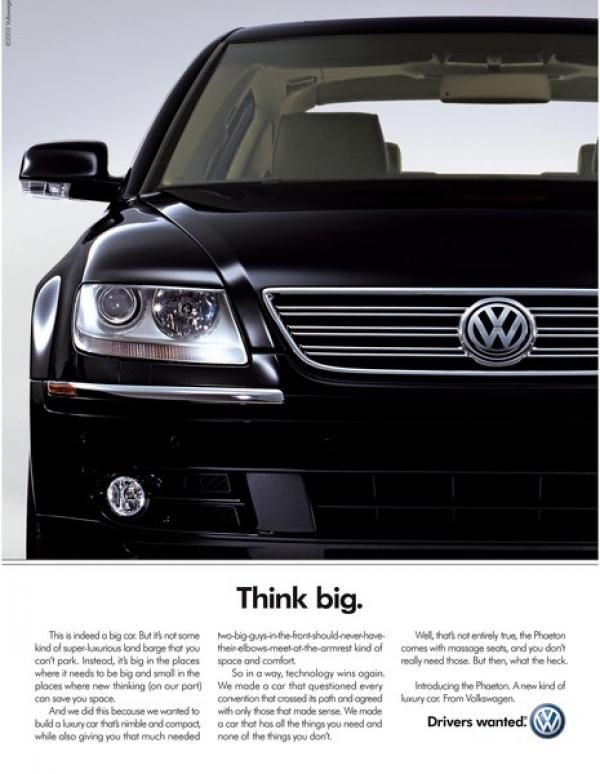

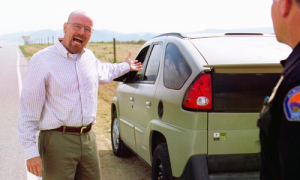








You wonder the decision making process at the automakers these days. The phaeton should have cost way less or been a Audi. Then they went on to not defending themselves with diesel-gate. And now going all electric by 2030 (lol). Keep doing what they are doing and there won’t be a VW, fancy or not…… Just another government motors.
The reality check is going to hard on everybody. Even for us all seeing it all coming. It’s going to be messy.
It is a sad story because they were wonderful cars. One of my neighbors has a W12, he said he will never be rid of it. I had often though about getting one myself. There a group here in Jacksonville that buys them from all over, refurbishes them. They get about a half dozen a year and they have a 3-4 year waiting list last check.
The cars failure really had nothing to do with the car itself. I have driven both the V8 and the W12 and enjoyed them way more than any S Class Benz. The Mercedes goes down the road like a Tiger tank, but these cars dance. It had balance an S class could only dream of.
Your points about the dealerships are well taken however not totally accurate. As the owner of quite a few Benz’s and Porsche’s over the years, it used to be pleasant to spend time in a high end client lounge at MB or Porsche, they were about the cars. The lounge had car videos, the magazines were all auto press, the amenities were good but really nothing all that special but who really cared? Under Brumos they were car and diver focused not soccer mom focused. The VW dealer down the street had a better coffee machine, but then Brumos had Hurley who was often there and you could sit down have a cup and a conversation with a true legend. I used to like to drop by to get a cup and spend time with the guys. These days that is discouraged, it’s all gone corporate.
It all changed when Fields Group bought the franchises, no more Brumo’s Driving experience – a day at the track with 3 Porsche drivers showing you how to drive your car to best effect. Now they have a cafe with omelets, not the same. The magazines are all Parenting and Golf Digest, and honestly the VW dealer lounge is vastly nicer than Fields Mercedes lounge.
Anyway great article, looking forward to the book!
That’s one helluva VW. Still a VW though. If they were planning on making a high tier Volkswagen they could have done a little better on the body design to try and attract the fancy boys to their product. Most high end German car buyers (who am I kidding, most people in general) are more concerned with the perceived status of their car not the reality of what the car actually is.
Reminds me of trying to set of my MB sprinter (badged as a Dodge) for repairs. Service manger says, not joking. “We don’t work on dodges here.” Then proceeds to tell me after I explained its a Benz. “We don’t work on the older models anymore.” Since when is 05 an older model?
Translation: Take your peasant van elsewhere, We’ll not have the rabble dirtying up the Kings quarters!
Yep. Be what you are.
a high end VW just doesn’t sit right with the people who have the cash to lay out for the high end car.
Hi Dan,
I think there is a legitimate want with regard to high-end cars and that is to want something that doesn’t look ordinary. I don’t mean it has to be flashy, much less garish. Just something special. A Passat is a very nice car. I like it a lot. But a $100k car should not look like a Passat – and I think that was a big (fundamental) problem with the Phaeton.
Also, people who pay that kind of money want – justifiably – a higher-end experience at the dealership. This is no slam directed at VW stores. But when you go to a Benz store, you see what I mean…
That sure doesn’t follow my recent service experience with Mercedes. They have firmly entered the untermarket lately, and selling cars outside MB’s traditional clientele and the service experience is beginning to reflect that. It just ain’t what it used to be.
Nice article Eric. I wasn’t even aware of this car and if it passed me i would have thought it was a passat. Interestingly my sister had a passat around 2003, nice car to drive.
Off topic now but did you see this article on zero hedge from friday where Toyota is warning for the 2nd time that the world is no where bear ready to move to an all electric fleet of cars?
https://www.zerohedge.com/technology/toyota-warns-again-about-electrifying-all-autos-anyone-listening
Everything stated in the article is obvious to anyone with half a logical brain but that won’t stop the virtue signaling elites and their useless idiots from pressing ahead with thier stupidity.
‘The result was a People’s Car for people who couldn’t afford it.’ — EP
… a concept now mandated by ‘Biden,’ in his executive decree that half the US auto market consist of EVs by 2030, when he will no longer be president or mentally present.
This will ‘put us on track to reduce greenhouse gas emissions from new passenger vehicle sales by more than 60 percent in 2030 compared to vehicles sold last year,’ says a White House press release.
Fake math, that is. Biden’s statistical liars count the EV half of the market as zero emissions, flagrantly ignoring the belching power plant smokestacks needed to recharge them.
That’s a Goebbels-scale Big Lie; absolutely brazen. But few members of Clowngress would be capable of detecting the deception, even if it were spelled out for them in a sciency comic book dumbed down to a sixth-grade level of reading comprehension.
Biden lies, freedom dies, patriots rise. Suck on this, Joe.
Not to mention that China and India are still building coal fired power plants, while the USSA is actively shutting down base load, reliable nuke and oil/gas plants. Better hope for some gale force winds to keep those windmills spinning! Meanwhile all that nasty CO2 from India and China will somehow be stopped at the border 😆.
Rode in one of these ages ago when I first moved to London. They are amazingly good, quite well finished and as you say back then they were at par with an S class. From what I understand it was purchased by the luxury limo company, but as it wasn’t an S class or something it got down graded to the level of car I was allowed. But i guess as you say most people who roam around in expensive cars do so because well they have prestige badges, to keep up with the Joneses…nothing to do with the spec or features they offer. On the flip side the luxury brands can sell striped out versions of their cars extremely successfully, even though they offer nothing of what the brand is know for (seen a base spec mercedes A, b, or even C lately? Its horrible).
But i guess that goes to show so much of the world today…. more about show than actual function and utility….
BTW Eric – I just heard Toyota has scrapped the Land Cruiser (the proper one) for the US…. (suspect you will write a similar tribute for that!). Again a car that is expensive because its built to last forever and go anywhere…. which now costs as much as a high end luxury car with none of the reliability and half the capability…. but again in the end its just a toyota, so why pay that money !
Fancy looking expensive chintzy shit pisses me off to no end. There are no more real high end items in the market now. You can spend more money but all you get is bedazzled chinesium with a few more whiz-bang features of marginal value built of the same bog standard landfill as the “cheap” model. Nothings worth buying now unless you can’t do without.
I had no idea that was such a dog of a vehicle, I just figured it was in the wrong showroom. It should have been over on the Audi side of the building.
The Top Gear (UK) review was pretty good IIRC but they didn’t need to live with it for more than a few days of filming. Is the W-12 the same engine as the Bugatti Veyron?
Hi RK- Thats what I never got about this – if they wanted to take on the S class they should have made it as an Audi – would have definitely been a lot more successful
I think the Veyron does the V16… i think this is the same as the bentleys
Great stuff Eric! I never heard of a W12 until now.
This would be the ultimate Anti-Virtue-Signaling vehicle to show up with at the local Green SJW convention. Pop the hood on that baby and let the SJW’s get a peak at all 12 cylinders capable of spewing god knows how much CO2 into the atmosphere. The plants would thank you, the SJW’s not so much.
Thanks for the kind words, Rush!
I got to drive one of these as a press car back in the early 2000s; the W12 purred. The car was subtle – and plush. But selling it at VW stores was like selling Rolexes at 7-11!